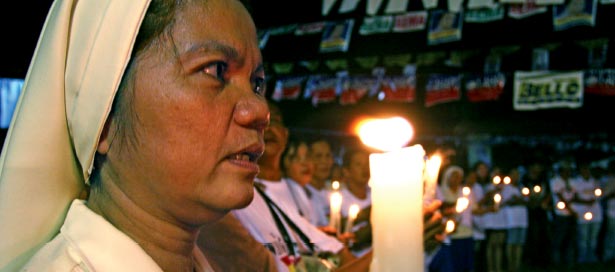To Bend and Bounce Back
What I Learned About Peacemaking From Filipinos
By Miriam Adeney | Photo by Jeoffrey Maitem / Getty Images
 A nun prays with other Roman Catholics and Protestants for peaceful polls ahead of the Philippine presidential election in 2010.
A nun prays with other Roman Catholics and Protestants for peaceful polls ahead of the Philippine presidential election in 2010.
“Why are we Filipinos so nice — even to invaders?” Jonathan asked me.
His question ultimately led to my doctoral dissertation in anthropology.
I had gone to the Philippines to direct the publishing program for Philippine InterVarsity Christian Fellowship. Jonathan was on the IVCF staff. When he asked that question, he was thinking of history. The Spanish took over the Philippines in 1570. The Americans kicked them out in 1898. The Japanese kicked out the Americans in 1941. Chinese often dominated the Philippine economy. Yet Filipinos remained remarkably gracious.
Studying 10 famous long narratives in Filipino literature (in Spanish, Tagalog, and English), I found four recurring “action models”: rebels, victims, puppets, and balancers. I came to see the last model — dynamic, resilient balancing — as a distinctively Filipino emphasis, with potential to bless the world. From a historical perspective, given the Philippines' location at the crossroads of powerful countries, resilient flexibility is an adaptive survival mechanism. It is not a weakness, but a strategic response.
Wave after wave has washed up on these shores. Successive torrents of Malay, Chinese, Indian, Arab, Spanish, American, and Japanese people have arrived. Generally Filipinos have allowed these new forms of life to take root and grow. Yet Philippine culture has not been drowned. In spite of massive change, Filipino values have continued strong, such as respect for elders, reciprocity, awareness of the supernatural, skillful speaking (and singing), and flexible balancing.
And Filipinos' propensity to bend and bounce back has positioned them to craft creative solutions to new problems. For example, 10 percent of the Philippine population is required to find jobs outside the country. That is the way the national economy is set up. Many work in the Middle East, often in positions far beneath their qualifications. Yet when I traveled to Kuwait, Oman, Dubai, Abu Dhabi, and Qatar last winter, I was astounded by the vigor and creativity of Filipinos' ministries.
Charis and Joshua met and married in the Gulf. They now have lived there 16 years, raising three children and filling regular jobs. At the same time, they each mentor 15 people individually in Christian leadership. Beyond that, they witness and gather believers into fellowships. Today they shepherd 2,000 people in Filipino, Vietnamese, West African, Korean, and Bangladeshi churches in the Gulf. Resilient creativity!
Or consider the People Power Revolution that ousted the dictator President Marcos in 1986. After Marcos' fraudulent election, two high officials defected and barricaded themselves in an army base. The Archbishop of Manila called Filipinos to surround them. Millions of Catholics, Protestants, and Muslims came. My friends were among them.
When government tanks rolled toward the crowd, nuns trained in nonviolent confrontation walked toward the tanks, poked flowers into the cannon barrels, and said to the soldiers, “We're going to pray the Lord's Prayer. Pray with us. If you can't say it aloud, say it in your hearts.”
Millions raised their voices in unison: “Our Father ...”
Three times the tanks revved up, and three times they halted. The next day President Marcos fled the country. In the annals of world history, it is a remarkable example of nonviolent political change with strong Christian input — and resilient creativity.
Finally I think of Dann and Joji Pantoja. They were comfortable and successful in Vancouver, British Columbia, when they felt called to move back to the Philippines. But they did not go to their home region. They put down new roots in the war-torn south. Today their two websites reflect their activities: peacebuilderscommunity. org and coffeeforpeace.com.
On the wall of their upscale coffee shop in Davao, Philippines, is a collage of their own personal photos. No photo is labeled. But the resilient creative networking it represents is breathtaking. “This is a leader in the Moro Islamic Liberation Front standing here with me,” Dann says. “And here's the head of the Armed Forces of the Philippines southern division. And here ...” Both branches of the widespread Marxist movement are represented. The Philippine Council of Evangelical Churches. Tribal leaders. Wealthy plantation owners. High government officials.
Dann has joined other peacemakers to pitch tents on a battlefield between two warring forces during a lull in fighting, resulting in peace. Most recently he has helped to create the new Muslimmajority Bangsamoro Autonomous Region — and to word a glowingly supportive statement from evangelical Christians. When it comes to peacemaking, different cultures bring different strengths to the task. Not all of us can be as nimble as many Filipinos. But we can welcome resilient creativity when we see it.
 Miriam Adeney is associate professor of world Christian studies at SPU. Among her books are Kingdom Without Borders, Daughters of Islam, and God's Foreign Policy. She presented a session on Filipino peacemakers at SPU's 2012
Day of Common Learning.
Miriam Adeney is associate professor of world Christian studies at SPU. Among her books are Kingdom Without Borders, Daughters of Islam, and God's Foreign Policy. She presented a session on Filipino peacemakers at SPU's 2012
Day of Common Learning.
